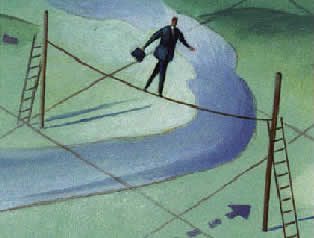 Real estate development (versus acquisition of existing rental communities) is a major part of what I do.
Real estate development (versus acquisition of existing rental communities) is a major part of what I do.
There is out there the saw that real estate developers are risk takers at a level that would make riverboat gamblers look like little old ladies attending Sunday morning church. That may be true of some. In this most recent real estate cycle I’ve seen stretches that boggled my mind, including two projects in my hometown that started but did not finish.
Personally, I’m risk averse. Very risk averse. A banker once told me he had never seen anyone who had acquired so much real estate while maintaining so low a risk profile. I took it as high praise.
How does one manage risk in business?
Strategically:
– Maintain an adequate liquid reserve. (All mine is in certificates of deposit and money market accounts. Dull, boring, low paying, but safe.)
– Keep your debt long term and fixed.
– Watch your cash flow. (I do use high leverage but with positive debt coverage ratios. It helps that residential rents and occupancies have historically been more stable than commercial rents. Caveat emptor: The past is an uncertain guide to the future at best.)
– Diversify your portfolio. (Of late I’ve moved into different markets, so one down local market will have limited impact on the entire portfolio. I need to do a LOT more of this.)
Tactically: Lots of due diligence, lots of skepticism.
You make your money on the deals you do, you keep your money on the deals you don’t do.
Before I do a deal, I ponder all the risk factors long and hard. I ask myself what could go wrong, think through how I would deal with it. I never assume blue skies forevermore. I have seen so many pro formas that never take into account the possibilities of a cloudy day, much less a rainy day, of anything ever going wrong. I call them Prozac pro formas.
The best thing is to find perceived risk that upon investigation is not real. That is the El Dorado, the payoff for willing to get off the beaten path and do what the other guy does not do. This does not happen very often but it is nice when it does.
Sometimes I am able to lay off risk, restructure the deal in some way to ameliorate the risk. One way is to avoid hard deadlines. I prefer soft deadlines or even an infinitely-expanding box: I have structured deals where I can always buy more time either by accepting a gradually rising interest rate, or by increasing the deposit every quarter, or by accepting a slowly rising price. None of them I like, but all of them are generally preferable to the alternative of all or nothing. Caveat: I’m comfortable with complexity; not everyone is. I’ve put deals at risk by attempting to add complexity. I love to make sure all the value in a deal has been realized, which is entirely separate from negotiating who gets the value. Different things are worth different things to different people. If a deal point is high value to the seller and low value to the buyer then it is wasteful for that deal point to remain on the buyer’s side of the table. But to accomplish full value realization, there has to be reasonably honest and open communication. Too, things can change, and awareness of the existence of additional value often occurs after the deal has been struck as greater familiarity with the various details emerges. The discovered value has to be major to justify re-opening negotiations. Unless the relationship is excellent or the other side is an old pro and flexible, there is too great a chance it will be seen as going back for another nibble versus a win-win effort.
If the risk is real and cannot be negotiated away, I try to offset it. I think of the game of chess, where a piece may be exposed in the middle of the board but it is covered by another piece. This may be as simple as increasing my cash reserves until the new deal is stabilized. Just make sure that you do not have one piece trying to cover two pieces––asking the cash reserves you set up for normal times to cover additional risk without increasing them. That doesn’t work.
One interesting scenario is to consider what happens if several things go wrong in sequence. It is more likely to happen than you might think. For instance, a decade ago I had a troubled development project. In response I focused all my energy on it as well as the energy of much of my top team. We pulled it out BUT my core operations had a mediocre year and cash flow was significantly off from projections. Why? My top people were elsewhere and their energies were missed.
In the past five years I’ve seen lots of novices plunge into the real estate arena. As long as the bull market continued, they were brilliant. A lot are getting caught short.
It is a mark of a true pro to never get so far extended that he cannot handle market change. Many amateurs attempt to emulate the external, visible actions of professionals without realizing the true depth of the analysis that goes on out of sight. The seasoned veteran may no longer be fully conscious of the entirety of how he does what he does, much of which may be going on at what has become an intuitive level.
This is my fourth real estate recession and I’ve slept well through all of them.


0 Comments